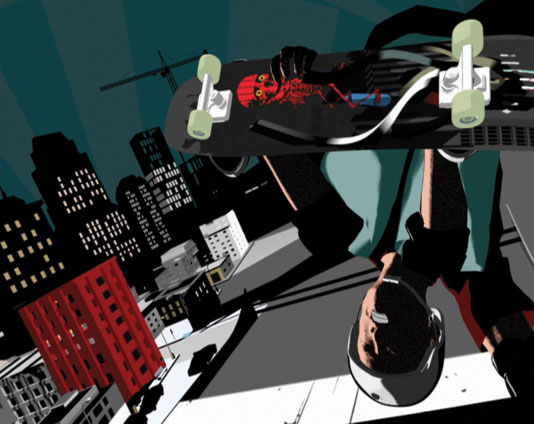“ESPN “Evolution”” by Motion Theory
Conference:
- SIGGRAPH 2004 More animation videos from SIGGRAPH 2004:


Title:
- ESPN “Evolution”
Length:
- 0:30
Company / Institution / Agency:
- Motion Theory
Description:
We know dinosaurs evolved from birds, and humans from apes, but just how did skateboarders arise? “Evolution,” the only animated installment in ESPN’s “Without Sports” campaign, answers that question in less than 30 seconds, while simultaneously echoing the campaign’s overall theme of the interconnectedness of sports and life.
“Evolution” begins with a surfer riding a wave to the tune of the Jimi Hendrix classic “Ezy Rider.” Soon, the surfboard sprouts wheels, “evolving” into a skateboard. The surfer then becomes a skateboarder as the environment and animation style progress through the 70s, 80s, and 90s. After riding up the side of an empty pool, the skateboarder sails off the end of a modern-day half-pipe, spinning into the clouds and leaving the tagline Without sports, evolution would just be a theory.
Hardware:
HARDWARE: PC/Intel Xenon dual 2.4 GHz CPU, 1.5 GB RAM.
Software:
SOFTWARE DEVELOPER: Modeling, animation, rendering, and dynamics: Maya 4.0.
Compositing: After Effects. Additional software: Photoshop,
Illustrator. OS: Windows XP
Additional Contributors:
Producer: Javier Jimenez
Creative Director: Mathew Cullen
Designers: Kaan Atilla, John Clark, Paulo De Almada, Tom Bruno, Tom Bradley, Chris De St Jeor, Ryan Alexander
Additional Information:
PRODUCTION
Modeling: polygon and subdivision surfaces for characters, NURBS for environments. Some 2D rotoscoping used on a couple skate- board moves. Rendering technique used most: toon shading. Average rendering CPU time per frame: 10 minutes. Total production time: 90 days. Production highlight: This project was unusually chal- lenging because in 30 seconds there were four complete style changes, which included even the clothes of the character, all in a single camera move. Each style was a different era of skateboard history.




